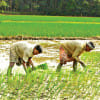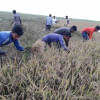A crisis within a crisis for Barind farmers

It is distressing to see the continued plight of famers in parts of the Barind region, known as the "rice bowl" of the country, where rapidly depleting groundwater levels have caused a catastrophic water crisis. A recent report by this daily shows how the distribution of irrigation water, through deep tubewells, has become a tool for individuals with political clout to exploit vulnerable farmers, particularly those from ethnic minority communities. This is what we can call "a crisis within a crisis", its magnitude exemplified by several farmer suicides, which calls for urgent interventions from the authorities.
The roots of the crisis can be traced back to the 1990s when deep tubewells were introduced, enabling farmers to cultivate multiple crops annually and transforming the Northwest into a thriving grain-producing hub. Ironically, it is this very success – on the back of excessive groundwater extraction – that contributed to the water crisis and attendant troubles. Although the Barind Multipurpose Development Authority (BMDA), responsible for overseeing irrigation, ceased installing new tubewells in 2012, unregulated private operators have continued to thrive. Today, these operators as well as the ones appointed by the BMDA are primarily responsible for much of the suffering being caused.
According to our report, farmers are supposed to pay a nominal fee for water under the BMDA management, which is Tk 85-125 per hour of irrigation. For context, there are approximately 16,000 government-run and 56,000 privately run deep tubewells in 16 districts of Rajshahi and Rangpur divisions. However, tubewell operators frequently sell water at higher rates to affluent farmers, breaching the "first come, first serve" policy. Marginal farmers are most at risk – sometimes the operators take away their smart cards and force them to enter into direct contracts with them, which means paying 6-28 times more than the government-fixed rate. Often, they are also denied water, leading to suffering and desperation. Despite some attempts to prevent it, however, political connections have continued to enable exploitation.
All this – against a backdrop of climate change and the region's crisis of groundwater, whose levels alarmingly fell by at least two feet over the last year alone – serves as a wake-up call for the authorities. Ridding the water irrigation/distribution process of exploitation, and ensuring equitable access for all farmers, is indeed the priority. Equally important, however, is finding a comprehensive solution that takes the bigger picture into account and addresses the water and livelihood crises in the region.


 For all latest news, follow The Daily Star's Google News channel.
For all latest news, follow The Daily Star's Google News channel. 









Comments